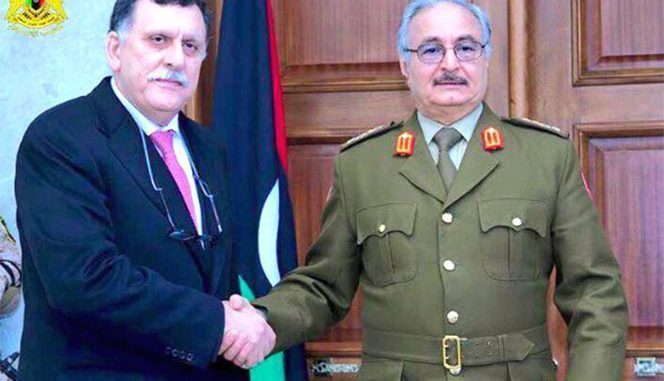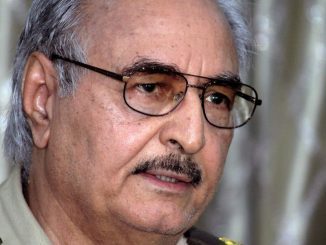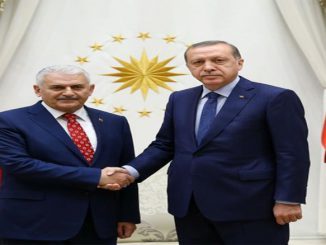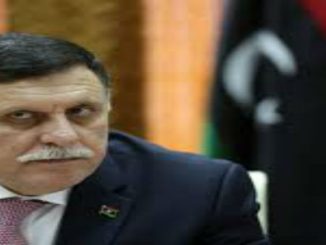
Both Presidency Council (PC) Chairman Fayez al-Serraj and General Khalifa Haftar arrived in Cairo today for joint talks hosted by the Egyptian government.
The meeting was initially supposed to have taken place on Monday but media reports indicate it has been postponed until Tuesday.
Haftar was accompanied by Abdul Basset Al-Badri, the Libyan ambassador in Riyadh and his close political adviser and friend, said the Libyan newspaper.
Al-Serraj was accompanied by Fathi Majbri, the PC member from Cyrenaica. It is alleged that he wanted to bring Presidency Council deputy chair Ahmed Maetig but that Haftar said he would not meet him under any circumstance.
The reason for the postponement of the meeting was that neither side would agree to conditions set by the other.
Both leaders have been meeting separately with Egyptian mediators , including Egypt’s Chief of Staff Lieutenant General Mahmoud Hegazi and at the time of writing, meetings were still ongoing to break the deadlock.
According to one report, Egyptian Abdel Fattah El-Sisi himself will chair the meeting, putting further pressure on Fayez and Haftar both to turn up and to reach an agreement.
In fact, Haftar has been under intense pressure from the Egyptians to meet al-Serraj and agree a compromise that would open the doors to a settlement in Libya.
Days ago, Libya Prospect, a Libyan News Website, cited a source inside the Egyptian Foreign Ministry saying that FM Sameh Shoukry has asked in a meeting with his Emirati counterpart, Abdallah Bin Zayed, Emirati leaders to “pressure Haftar to avoid any moves that could escalate new conflicts.”
According to the Egyptian sources, “Haftar opposed the Egyptian efforts to organize a meeting with the head of the Presidential Council (PC) of the Government of National Accord (GNA), Fayez Al-Serraj in Cairo.” The proposal was made by Russia, holding to a military approach.”
Up until last month, he resolutely refused to do so.
On the other hand, al-Serraj has wanted for some time to negotiate directly with Khalifa Haftar and has agreed that he should be given a role in the Libyan government.
Libya Express cited a source- who spoke on condition of anonymity- that Al-Serraj will propose that the suggested mini-government would have a unified military council headed by Khalifa Haftar, in cooperation with military officers from all across Libya.
However, his offer at the moment is believed to be the one approved by the House of Representatives’ President Aqila Saleh, that the role of commander-in-chief of the Libyan armed forces should be shared between the head of the presidency council, the head of the HoR and the head of the State Council.
However, the offer is reportedly unlikely to be accepted by Haftar.
It is worth to mention that Al-Sisi’s military and political officials have been working throughout the previous months with different Libyan factions to strengthen Haftar’s role in Libya especially by focusing on amending the Political Agreement (PA) article that outlined the authorities of the Libyan army chief commander and that also excluded Haftar from leading the army.
In this context, excessive meetings have been held, under Egypt’s auspices, with several Libyan officials and members in Tobruk’s House of Representatives to resolve the Libyan crisis and amend the Skhirat agreement in a way that enclose Libya’s strongman in the political process.
On December 13, 2016, Cairo hosted a conference attended by Libyan officials and representatives from the country’s numerous factions, where they issued a declaration of principles and five proposed amendments to an agreement, brokered by the UN in 2015.
The Libyan Political Agreement, signed in Skhirat, Morocco December 2015 known as the Skhirat Agreement, intensified the internal strife rather than resolving it.
The conference concluded an agreement on amending the 8th article of the 2015 agreement that outline the authorities of the Libyan army chief commander.
The article constituted a major obstacle during signing Skhirat agreement as it included the exclusion of General Khalifa Haftar from leading the army.
The conference meetings were brokered under the auspices of the Egypt’s General Intelligence Directorate and in a hotel related to the security entity.
The conference concluded what the participants consider as “a road map to achieve unity in Libya during the coming period, “and one of the major recommendations presented by the participants, “to reconsider the responsibilities of the army chief commander that is currently held by Aqila Saleh, the head of Tobruk’s House of Representatives (HoR), who has promoted General Khalifa Haftar to Field Marshal last September.
As for Europe, the latest European Union meeting discussed the possible role of the commander of the army of the House of Representatives (HoR), Khalifa Haftar, in the United Nations-backed government, amid fears of him exerting control over the government, said Boris Johnson, the British Foreign Secretary.
Johnson also said that the Europeans “discussed the need to unify the eastern and western Libya as the Libyan Political Agreement says.”
Moreover, Federica Mogherini, the High Representative for Security and Foreign Policy in the European Union, said that “the European Union is willing to facilitate a meeting between Al-Serraj and Haftar, while continue supporting the PC.”
Haftar is a military figure, backed by Tobruk government based in eastern Libya that refuses to recognize the U.N.-backed government, enjoys the support of several Arab nations, including Egypt, the United Arab Emirates, and Jordan, as well as western countries as France.
Since the Libyan Revolution that overthrew the long-time dictator 2011 Muammar Gaddafi, violence has spread in Libya among the different Libyan factions.
Two rival governments operate in Libya, with self-proclaimed authorities controlling the capital of Tripoli and adjacent western areas and an internationally recognized government, based in the eastern Libyan city of Tobruk.
Moreover, a third government was formed known as the Government of National Accord(GNA) supported by many western countries. The government has so far failed to restore the country’s unity.
None of the governments has a complete dominance over Libya until now.



